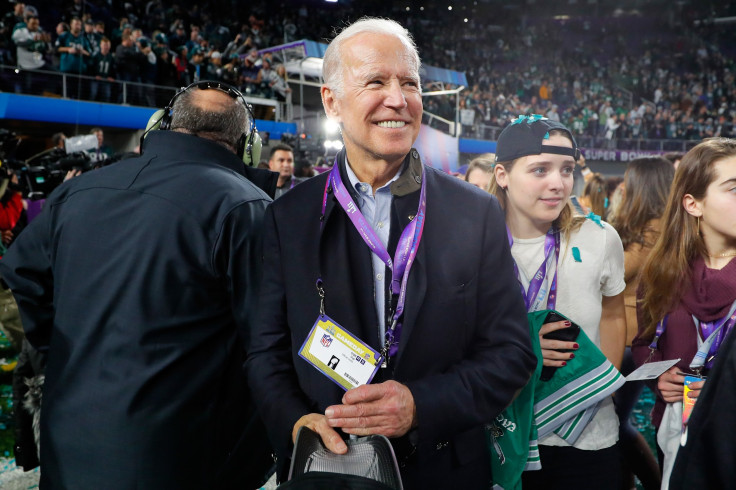Biden Rolls Out $5 Trillion Climate Plan, Borrowing From Green New Deal

Former Vice President Joe Biden in his bid for the White House today released a plan to address clean energy research and infrastructure, which he intends to pay for by rolling back Republican tax cuts.
The “Biden Plan for a Clean Energy Revolution & Environmental Justice” aims to roll back $1.7 trillion in tax cuts to fund a net-zero emissions and 100% clean energy economy by 2050. The former vice president’s plan seeks a total investment of $5 trillion over 10 years to achieve renewable energy goals. In addition to a tax increase on higher income earners, investment from state and local government, as well as private investment, would cover the remaining $3.3 trillion.
Joe Biden's $5 trillion climate proposal: net zero carbon emissions by 2050 https://t.co/JNQwkB0X1g
— TIME (@TIME) June 4, 2019
Biden said he would reenter the Paris Climate accord and ban new gas and oil permits on federal lands and waters.
"Science tells us that how we act or fail to act in the next 12 years will determine the very livability of our planet," Biden said in a statement. "That’s why I’m calling for a Clean Energy Revolution to confront this crisis and do what America does best — solve big problems with big ideas.”
While referring to the Green New Deal championed by Rep. Alexandria Ocasio-Cortez, D-N.Y., and others, the Biden Plan extends the time to meet net-zero emissions by 20 years, and shies away from developing alternative energy, such as wind and solar. The Green New Deal ambitiously calls for a 100% renewable energy power grid by 2030, while Biden seeks net-zero emissions by 2050.
Biden’s plan comes weeks after progressive Democrats asserted the former Delaware senator was seeking a middle ground alternative to the Green New Deal that critics have said would not go far enough in addressing climate change.
The Energy 202: Joe Biden vows to "go well beyond" Obama with new climate plan https://t.co/j6PL461J6K
— The Washington Post (@washingtonpost) June 4, 2019
Sen. Bernie Sanders, the Vermont Independent who trails frontrunner Biden in polls, said Sunday Democrats should not seek a middle ground solution to climate change, and instead “have to go forward with a new and progressive agenda.”
The Sunshine Movement, a leading proponent of the Green New Deal, has pressured Biden to take a more aggressive stance on fighting climate change. In a statement, the executive director of the Sunshine Movement, Varshini Prakash, said the “pressure worked” since Biden has incorporated the Green New Deal in his comprehensive plan.
Biden’s plan would reinstate Obama administration rules for car fuel economy and methane emissions regulations that were reversed by the Trump administration. It also proposes crackdowns on corporate polluters that Biden has said, “disproportionately harm communities of color and low-income communities.”
Making these revolutionary changes is going to take an incredible commitment at all levels, but I know we can meet this challenge.
— Joe Biden (@JoeBiden) June 4, 2019
Because this is what America does best—solving big problems, with big ideas. If you agree, please sign your name here: https://t.co/Fn5XTDtfQZ
In addition to the Green New Deal, some other presidential hopefuls have rolled out extensive plans to deal with climate change and renewable energy. Former Texas Rep. Beto O’Rourke also has called for a $5 trillion investment plan to combat climate challenges, and Washington Gov. Jay Inslee has made climate change the centerpiece of his presidential campaign. His plan aligns with the Green New Deal in terms of timeline, seeking to achieve zero emissions for some new vehicles and eliminate carbon pollution by all commercial and residential buildings in 2030.
Many of the 23 Democratic presidential candidates have said once in the White House, they will seek the rollback of 2017 GOP tax cuts to fund infrastructure projects, child care, and “baby bonds,” which are savings accounts for newborns.
Biden is seeking to win votes from working- and middle-class and has said his plan will not take away blue collar jobs. One of the five main goals of the Biden plan promises to "fulfill our obligation to workers and communities who powered our industrial revolution,” a refrain similar to the social justice component of the Green New Deal.
Biden’s campaign on Tuesday praised the progressive policies of the Green New Deal, calling it a “crucial framework for meeting climate challenges."
© Copyright IBTimes 2024. All rights reserved.





















